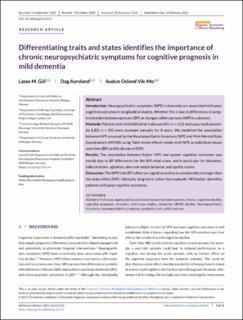Differentiating traits and states identifies the importance of chronic neuropsychiatric symptoms for cognitive prognosis in mild dementia
Journal article, Peer reviewed
Published version

Åpne
Permanent lenke
https://hdl.handle.net/11250/2980580Utgivelsesdato
2021Metadata
Vis full innførselSamlinger
- Department of Clinical Medicine [2066]
- Registrations from Cristin [9791]
Originalversjon
Alzheimer's and Dementia: Diagnosis, Assessment and Disease Monitoring. 2021, 13 (1), e12152. 10.1002/dad2.12152Sammendrag
Introduction
Neuropsychiatric symptoms (NPS) in dementia are associated with poor cognitive outcomes in longitudinal studies. Whether this is due to differences in symptom burden between persons (BP) or changes within persons (WP) is unknown.
Methods
Patients with mild Alzheimer's disease (AD, n = 111) and Lewy-body dementia (LBD, n = 85) were assessed annually for 8 years. We modelled the association between NPS assessed by the Neuropsychiatric Inventory (NPI) and Mini-Mental State Examinations (MMSE) using Tobit mixed-effects model with NPS as individual means over time (BP) and its deviance (WP).
Results
The association between higher NPS and poorer cognitive outcomes was mostly due to BP differences for the NPI-total score, and in particular for delusions, hallucinations, agitation, aberrant motor behavior, and apathy scores.
Discussion
The NPS trait (BP) effect on cognitive decline is considerably stronger than the state effect (WP). Clinically, long-term rather than episodic NPS better identifies patients with poor cognitive outcomes.
